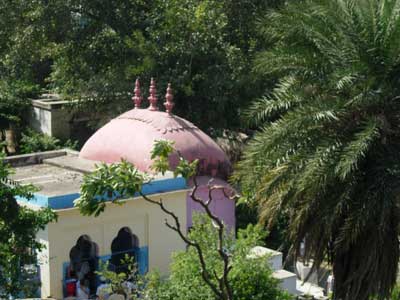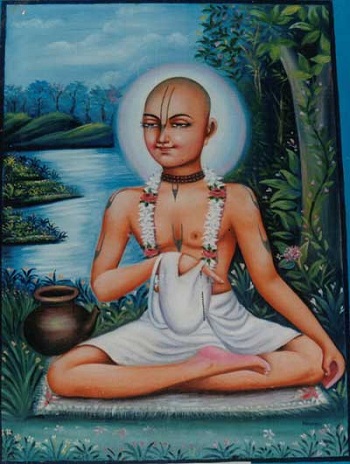Tridandisvami Sri Srimad Bhaktivedanta Narayana Gosvami Maharaja
June 2nd, 2000
Badger, CA
[ Click to listen]
I want to tell you something, and then I will begin my class. Srila Rupa Gosvami and Srila Sanatana Gosvami were very intelligent in their worldly life. Due to their extraordinary intelligence, the Muslim king invited them to be engaged in government service. He changed their names to Dabir Khas and Sakara Mallika, and kept them as his private secretary and minister. He believed so much in them. Then Caitanya Mahaprabhu came and met with them. After giving them instructions He returned to Puri, and Rupa Gosvami, along with Anupama, left his kingly position and went to Vrndavana to meet Him again. When Mahaprabhu was returning from Vrndavana they met in Prayag, and Mahaprabhu sprinkled His mercy on him. He said, "The ocean of rasa is endless and depthless. I am giving some of it to you, and you should taste it." He sprinkled His mercy, by His eyes and by embracing him, and in this way Rupa Gosvami became complete. Mahaprabhu then gave him so many instructions and, proceeding towards Kasi, told Rupa Gosvami, "You should go to Vrndavana." Rupa Gosvami went to Vrndavana and Mahaprabhu then went to Varanasi to meet Sanatana Gosvami.
In what condition did Srila Sanatana Gosvami meet Mahaprabhu? Mahaprabhu was sitting inside the room at Candrasekhara's house, and Sanatana Gosvami, looking like a Muslim mendicant, was at the door. He knew that Mahaprabhu was inside that house and he wanted to meet Him, but he was somewhat shy. He was thinking: "How can I go? I am like a Muslim fakir." Mahaprabhu then told His associate, Candrasekhara Acarya, "Can you see who is waiting at the door?" He went there, but didn’t see anyone. He returned and said, "No one is waiting." Mahaprabhu then said, "You should bring anyone who is standing there." Candrasekhara answered, "There is only a Muslim fakir there.” Mahaprabhu replied, "You should call him." When Sanatana Gosvami entered, Mahaprabhu very quickly ran towards him to embrace him. Sanatana Gosvami, however, began walking backwards and said, "Mahaprabhu, You should not do this. I am very wretched and fallen -- a Muslim. Oh, don’t touch me". Actually, Sanatana Gosvami came from an aristocratic family of brahmanas. He was a very learned person, but he was posing as fallen. Mahaprabhu said, "I am not touching you for your benefit. I am touching you for My benefit, so that I will become pure." He then quickly embraced him.
Mahaprabhu said, "How did you come here? Oh, Krsna is so merciful that He has mercifully brought you from the ditch or ocean of stool. Sanatana Gosvami said, "I do not know Krsna. I only know Your mercy. Your mercy has done this. "Mahaprabhu then said, "You should be totally shaved, and then come." Sanatana Gosvami went to the Ganges river, took bath, and cleaned everything. When he returned, Mahaprabhu told Candrasekhara, "You should give him a dhoti, a bahirvasa and an uttariya." Candrasekhara gave him a new, very fine cloth, but he refused to take it. He said, " I do not want this new, fine cloth. I want any of your old dhotis." So Candrasekhara gave him that and he accepted it. He made three pieces from it; one piece for uttarya bahiravasa, and the others for dor and kopin. Mahaprabhu was so much pleased. Sanatana Gosvami then quickly went to the Ganges again. There He saw a beggar who had a very worn out quilt. Sanatana Gosvami gave him his very costly blanket and said, "Can you give that old and torn blanket to me?” The beggar replied, “Are you are joking with me? You will give this precious blanket to me in exchange for this old and torn one? I don’t believe you." Sanatana Gosvami forcibly took it and washed it in the Ganges. Then he returned and Mahaprabhu became so happy.
If you want to have krsna-prema, you will have to follow the six Gosvamis. Srila Raghunatha das Gosvami, Srila Jiva Gosvami, Srila Rupa Gosvami -- all were like this. None are inferior to the other. When we will try to judge, we will see that each one of them is so high. We will not be able to decide. They were so humble, knowing all these special truths. If we want to achieve the goal of our life, which is krsna-prema, we will have to follow in this birth. Or, if it is not possible to fully follow in this birth, we will have to gradually follow the process for lakhs and lakhs of births. It may take a day or a moment, but you will have to follow. There is no other way. Better to follow in this life.
The Crest-jewel of Inquiry
Srila Sanatana Gosvami inquired from Sri Caitanya Mahaprabhu, “I have come to this world, but I do not know who I am. Who am I?”
 Sanatana Gosvami SamadhiIn order to understand this subject, we will turn to the translations of Srila Bhaktivedanta Svami Maharaja. In Sri Caitanya-caritamrta, Madhya-lila 20.102-103 his translation states:
Sanatana Gosvami SamadhiIn order to understand this subject, we will turn to the translations of Srila Bhaktivedanta Svami Maharaja. In Sri Caitanya-caritamrta, Madhya-lila 20.102-103 his translation states:
Who am I? Why do the threefold miseries always give me trouble? If I do not know this, how can I be benefited? Actually, I do not know how to inquire about the goal of life and the process for obtaining it. Being merciful upon me, please explain all these truths.
None of us know who we are by spiritual constitution. Someone may consider, “I am Isa Prabhu,” another may think, “I am Kesava Prabhu,” and others may conjecture that they are this or that person. Therefore, in order to indicate our true identity, Srila Sanatana Gosvami humbly questioned Sri Caitanya Mahaprabhu.
Mahaprabhu replied, “You know everything, but you are inquiring about your true identity so as to uplift others. Although a saintly person knows everything, he remains very humble and tries to confirm his statements by asking the higher authorities.”
krsna-sakti dhara tumi, jana tattva-bhava
jani’ dardhya lagi’ puche,-sadhura svabhava
(Sri Caitanya-caritamrta, Madhya-lila 20.105)
Since you possess Lord Krsna’s potency, you certainly know these things. However, it is the nature of a sadhu to inquire. Although he knows these things, the sadhu inquires for the sake of strictness.
Mahaprabhu continued, “You are not really Sanatana, in the sense that you are not this physical body.”
jivera ‘svarupa’ haya——krsnera ‘nitya-dasa’
krsnera ‘tatastha-sakti’ ‘bhedabheda-prakasa’
suryamsa-kirana, yaiche agni-jvala-caya
svabhavika krsnera tina-prakara ‘sakti’ haya
(Sri Caitanya-caritamrta, Madhya-lila 20.108–109)
It is the living entity’s constitutional position to be an eternal servant of Krsna, because he is the marginal energy of Krsna – a manifestation simultaneously one with and different from the Lord, like a molecular particle of sunshine or spark of fire. Krsna has three varieties of energy.
Sri Caitanya Mahaprabhu explained that by spiritual constitution, all those who have life – such as human beings, birds, animals, trees and creepers, and even worms and insects – are all eternal servants of Lord Krsna. All souls are transformations of the Lord’s marginal potency (tatastha-sakti parinama). They are not direct transformations of svarupa-sakti.
Sri Caitanya Mahaprabhu continued:
krsna bhuli’ sei jiva anadi-bahirmukha
ataeva maya tare deya samsara-duhkha
(Sri Caitanya-caritamrta, Madhya-lila 20.117)
Forgetting Krsna, the living entity has been attracted by the external feature from time immemorial. Therefore, the illusory energy maya gives him all kinds of misery in this material existence.
Srila Krsnadasa Kaviraja is quoting the version of Sri Caitanya Mahaprabhu. The jiva, the eternal servant of Krsna, is Krsna’s marginal potency (tatastha-sakti). Essential to understand and remember is that he is not pure svarupa-sakti, or internal potency. Tatastha-sakti is one of the energies of svarupa-sakti, but it is not full.
Svarupa-sakti has three functions (vrttis), namely transcendental happiness (hladini), divine knowledge (samvit), and spiritual existence (sandhini). It is from svarupa-sakti that Lord Nrsimha, Lord Rama, and other direct incarnations of Krsna manifest, and these incarnations are called svamsa, Krsna’s personal expansions. [Sva means ‘own’ or ‘plenary’ or ‘direct,’ and amsa means ‘part’ or ‘expansion.’] This is not true for the vibhinnamsa-tattva jivas [vibhinna means ‘separated’ and amsa means ‘portion.’]
svamsa-vibhinnamsa-rupe hana vistara
ananta vaikuntha-brahmanòe karena vihara
(Sri Caitanya-caritamrta, Madhya-lila 22.9)
Krsna expands Himself in many forms. Some of them are personal expansions and some are separate expansions. Thus He performs pastimes in both the spiritual and material worlds. The spiritual worlds are the Vaikuntha planets, and the material universes are brahmandas, gigantic globes governed by Lord Brahma.
A question arises: if all souls are eternal servants of Sri Krsna, how could they have become averse to Him? Why did they turn away from Him? The answer is that the jivas who became averse had not yet realized their constitutional position of eternal service.
Two Kinds of Souls
There are two categories of jivas, as stated in Sri Caitanya-caritamrta, Madhya-lila 22.10–13:
sei vibhinnamsa jiva – dui ta’ prakara
eka – ‘nitya-mukta’, eka – ‘nitya-samsara’
(Sri Caitanya-caritamrta, Madhya-lila 22.10)
The living entities, the jivas, are divided into two categories. Some are nitya-mukta, eternally liberated, never having been conditioned, and others are perpetually conditioned (nitya-samsara, or nitya-baddha).
The meaning of nitya-samsara in this verse is not ‘forever conditioned.’ It means that the time we have been conditioned is so vast that it cannot be calculated.
‘nitya-mukta’ – nitya krsna-carane unmukha
‘krsna-parisada’ nama, bhunje seva-sukha
(Sri Caitanya-caritamrta, Madhya-lila 22.11)
Those who are eternally liberated are always awake to Krsna consciousness, and they render transcendental loving service at the feet of Lord Krsna. They are to be considered eternal associates of Krsna, and they are eternally enjoying the transcendental bliss of serving Him.”
This is a prominent point to understand. The liberated jivas are eternal associates of Sri Krsna in His abode, always engaged in serving Him and relishing the sweetness of their service to Him. In the Lord’s abode, the potency that bewilders the conditioned soul and encourages him to identify with his body is not present.
Only Yogamaya, the spiritual potency that nourishes the service mood of liberated souls, is present there. There is nothing in the spiritual world to make one forget Krsna, and therefore the Lord’s associates are never liable to forget Him or become averse to Him. The love and affection of these associates is always fresh and ever-new; it is ever-unfolding. Even if the ‘newness’ of the love and affection reaches its limit and there is no room for further newness, still, it becomes ever-increasingly new and fresh.
In regard to the second category of jiva:
nitya-baddha’ – krsna haite nitya-bahirmukha
‘nitya-samsara’, bhunje narakadi duhkha
(Sri Caitanya-caritamrta, Madhya-lila 22.12)
Apart from the ever-liberated devotees, there are the conditioned souls, who always turn away from the service of the Lord. They are perpetually conditioned in this material world and are thus subjected to the material tribulations brought about by different bodily forms in hellish conditions.
sei dose maya-pisaci danda kare tare
adhyatmikadi tapa-traya tare jari’ mare
(Sri Caitanya-caritamrta, Madhya-lila 22.13)
Due to his being opposed to Krsna consciousness, the conditioned soul is punished by the witch of the external energy, maya. He is thus ready to suffer the threefold miseries brought about by the body and mind, the inimical behavior of other living entities, and natural disturbances caused by the demigods.
The souls in the second category – the conditioned souls – have never directly associated with Krsna. They have never relished His service, and that is why they are called nitya-bahirmukha, or conditioned from beginningless time.
The above-mentioned verse states that the souls in the second category are being punished by maya. Why are they being punished? What have they done wrong? Their defect is that they have chosen to turn away from Krsna. They preferred to look towards the material world for pleasure; in this way it is considered that they are opposed to Krsna consciousness.
Still, although they have never relished the sweetness of serving Krsna nor do they possess knowledge about such service, they are Krsna’s tatastha-sakti, His marginal energy. They are His eternal servants by their constitutional position.
A certain type of jiva manifests in the spiritual world – from Krsna’s first expansion, Sri Baladeva. The jivas who manifest from Baladeva are called nitya-unmukha, meaning that they are always serving Krsna. Although all tatastha-sakti jivas are servants by constitution, the second kind of jiva has not come from Goloka Vrndavana. The conditioned souls of this world have never been in Goloka Vrndavana. They are coming from Karanodakasayi Visnu , in the realm between the spiritual and material world.
Srila Jiva Gosvami clarifies our understanding of the two kinds of jivas. He states in his Paramatma-sandharbha:
tad evam ananta eva jivakhyas tatasthah Saktayah / tatra tasam varga-dvayam / eko vargo’ nadita eva bhagavad-unmukhah / anyas tv anadita eva bhagavat-paraìmukhah / svabhavatas tadiya-jnana-bhavat tadiya-jnanabhavat ca
(Paramatma-sandarbha, Anuccheda 47, Text 1)
Thus the Lord’s marginal potency is comprised of individual spirit souls. Although these individual spirit souls are limitless in number, they may be divided into two groups: (1) the souls who from time immemorial are favorable to the Supreme Lord; and (2) the rebellious souls who from time immemorial are averse to the Supreme Lord. One group is aware of the Lord’s glories and the other group is not aware of them.
Here, Srila Jiva Gosvami explains that there are unlimited jivas emanating from tatastha-sakti, and from there some have turned away from Krsna. They turned away from Krsna and chose to enter the material world, which is a ‘dream-place’ (svapna-sthana). In the material world it appears that one person is aware of the world around him, another is dreaming, and another is fast asleep without dreaming at all. Actually, everyone here is dreaming, because this entire place is a dream-place. The jivas’ sleep in this dream-place is not so deep that they are fully unconscious, because they are part of the spiritual conscious substance (cit-vastu) even when they are not liberated. Rather, they are experiencing a dream of material designations.
Regarding the souls coming from the divine light-filled glance of KaranodakaSayi Visnu: Within that light, Krsna in His form as Visnu gives them the intelligence and freedom to consider, “What should I do?” There is a very fine, imaginary line between the transcendental and material worlds. Krsna gives the jivas some freedom, saying in effect, “From here you can look towards this world of maya and you can also look towards the spiritual world. What you choose depends upon you. I will give you a moment to decide.”
Certain jivas looked from the tatastha region towards the spiritual world and were attracted there. Yogamaya at once gave them the power of bhakti to go there, to serve Krsna for eternity. Others looked toward the material world, they were attracted, they decided to relish it, and thus they were granted their desire.
The jivas in this region were within the body of Karanodakasayi Visnu, in seed form, and when they came out through His glance, some fell in maya. This truth has been substantiated in Sri Brahma-samhita:
The Lord of the mundane world, Maha-Visnu (Karanodakasayi Visnu), possesses thousands upon thousands of heads, eyes, and hands. He is the source of thousands upon thousands of incarnations in His thousands upon thousands of subjective portions. He generates thousands upon thousands of individual souls. (Sri Brahma-samhita, Text 11)
An unlimited number of atomic conscious particles emerge from the spiritual rays of Paramatma as the aggregate of the living entities. These innumerable jivas have no relation with the mundane world when they come to know themselves to be the eternal servants of the Supreme Lord. At that time, they are incorporated into the realm of Vaikuntha.
(Sri Brahma-samhita, Text 16, purport)
The svarupa-Sakti, or internal potency of Krsna, which is spiritual, functioning as His own personal power, has manifested His pastimes of Goloka. By Her grace, individual souls who are constituents of the marginal potency can have admission into even those pastimes.
(Sri Brahma-samhita, Text 6, purport)
Everything Is Present in the Divine Seed
Spiritual identity is already present within the soul, in seed-form. Consider the analogy of a mango seed. If you plant a mango seed in fertile ground and give it water, gradually a sprout will emerge. After a few days, some leaves will unfurl and later some branches will begin to grow. After a few years, the plant will become quite large, with an abundance of leaves, branches, and flowers. One day, mangos will begin to swell on its branches, and then they will ripen and become sweet and juicy.
Everything needed to produce a mango tree is present within the mango seed. The potency of the leaves, branches, and fruits is dormant within the seed, as well as the number of leaves and the sweetness of the fruit.
Similarly, the personal form of the soul is now present in a latent state. Everything about the soul’s spiritual form, dress, nature, dwelling place, and service is present within the soul, even though the pure transcendental form has not developed and was never previously developed.
Sri Krsna states in the Bhagavad-gita (15.6): Yad gatva na nivartante tad dhama paramam mama. This indicates that by practicing bhakti-yoga for thousands upon thousands of lifetimes, one’s spiritual form is developed. Thus, one is liberated and granted the benediction of entrance into the spiritual world, from which he will never return to this world. Those from this world who are liberated by practicing bhakti-yoga are serving Krsna in Vaikuntha in His forms as Rama, Nrsimha, Kalki, or Vamana, or in Goloka as Mathuresa or Krsna. They are all liberated. They will never return to the world of repeated birth and death. Srila Bhaktivedanta Svami Maharaja writes in his translation of the above mentioned verse:
That supreme abode of Mine is not illumined by the sun or moon, nor by fire or electricity. Those who reach it never return to this material world.
(Bhagavad-gita 15.6, purport)
Question: Someone may say, “Yes, we accept what Krsna spoke in the Bhagavad-gita – that once going to Vaikuntha from this world, we don’t return to this world. But we did fall from there before we first came to this world.”
Srila Narayana Gosvami Maharaja: If this were true, the principle stated in the Bhagavad-gita and other scriptures would still be a fallacy. Our scriptures propound only reality. For those souls who are already serving in that realm, there is no maya at all. There is no chance of becoming averse to Krsna. For one who is eternally in that realm and for one who has attained that realm from this material world – both kinds of souls never fall, for there is no maya in God’s abode.
In this connection we should try to follow the teachings of Srila Jiva Gosvami, our tattva-acarya, as well as the teachings of our disciplic line of spiritual masters such as Srila Baladeva Vidyabhusana, Srila ViSvanatha Cakravarti Thakura, and especially Srila Bhaktivinoda Thakura. If there is any confusion when reading the words of a particular bona fide guru, we can reconcile and clarify our understanding by taking help of the words of the other bona fide gurus in our disciplic line.
Jiva Gosvami is a very bona fide guru. He has explained this subject and all other spiritual subjects in his Sandarbhas, leaving no scope for doubt. We will have to read his words in order to reconcile, and in this way we will be able to see the compatibility, consistency, and harmony in the teaching of all our acaryas.
It is also essential to read the books of the Seventh Gosvami, Srila Bhaktivinoda Thakura, who is also a bona fide guru like Jiva Gosvami and Rupa Gosvami. He clearly elucidates these truths of the soul in his book, Jaiva-dharma. There, he writes that innumerable eternal souls have emanated from Baladeva Prabhu in Goloka Vrndavana, like the sakhas, Nanda Baba, and other associates. Regarding the gopis there, unlimited gopis are bodily manifestations (nitya-siddha kayavyuha-rupa) of Srimati Radhika. Those gopis who are not Her bodily manifestations are coming from Baladeva; they are also eternally liberated and eternally serving Krsna.
Srila Bhaktivinoda Thakura explains that this principle is also applicable in Dvaraka and Vaikuntha. In Dvaraka, the jivas are coming from Baladeva Prabhu’s expansion, Mula-Saìkarsana, and in Vaikuntha they are coming from His expansion known as Maha-Sankarsana.
All these eternal souls are serving in one of two ways: in Krsna’s sweet, human-like pastimes (madhurya-lila); or in His opulent pas-times (aisvarya-lila) as Dvarakadisa, the prince of Dvaraka, and Narayana, the Lord of Vaikuntha. Regarding those jivas manifested from Karanodakasayi Visnu in the tatastha region or marginal line, they are two kinds: some liberated (those who turned towards the spiritual world) and some conditioned (those who turned towards the material world).
Srila Bhaktivedanta Svami Maharaja has accepted this line of guru-parampara, more than us. He is a realized soul. He never says anything different from the words of our previous acaryas. Srila Bhaktivinoda Thakura has accepted all the previous acaryas in the line of Srila Rupa Gosvami, Srila Bhaktisiddhanta Sarasvati Gosvami Thakura has accepted Srila Bhaktivinoda Thakura, and Srila Bhaktivedanta Svami Maharaja has accepted his Gurudeva, Srila Bhaktisiddhanta Sarasvati Gosvami Thakura. With this understanding, we can reconcile.









